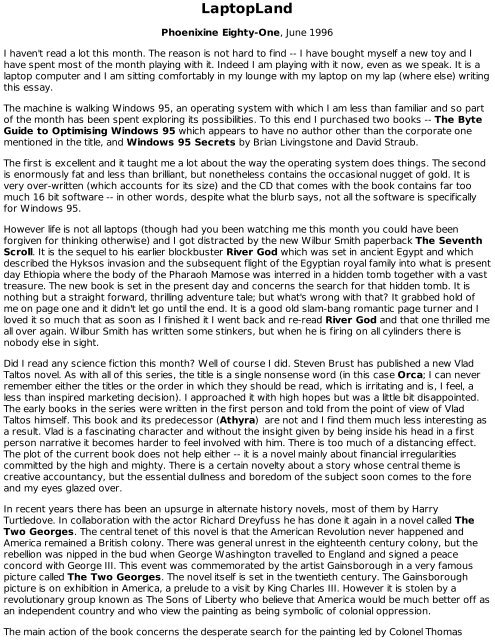Triffids Beard 2 - The Bearded Triffid
Triffids Beard 2 - The Bearded Triffid
Triffids Beard 2 - The Bearded Triffid
Create successful ePaper yourself
Turn your PDF publications into a flip-book with our unique Google optimized e-Paper software.
LaptopLand<br />
Phoenixine Eighty-One, June 1996<br />
I haven't read a lot this month. <strong>The</strong> reason is not hard to find -- I have bought myself a new toy and I<br />
have spent most of the month playing with it. Indeed I am playing with it now, even as we speak. It is a<br />
laptop computer and I am sitting comfortably in my lounge with my laptop on my lap (where else) writing<br />
this essay.<br />
<strong>The</strong> machine is walking Windows 95, an operating system with which I am less than familiar and so part<br />
of the month has been spent exploring its possibilities. To this end I purchased two books -- <strong>The</strong> Byte<br />
Guide to Optimising Windows 95 which appears to have no author other than the corporate one<br />
mentioned in the title, and Windows 95 Secrets by Brian Livingstone and David Straub.<br />
<strong>The</strong> first is excellent and it taught me a lot about the way the operating system does things. <strong>The</strong> second<br />
is enormously fat and less than brilliant, but nonetheless contains the occasional nugget of gold. It is<br />
very over-written (which accounts for its size) and the CD that comes with the book contains far too<br />
much 16 bit software -- in other words, despite what the blurb says, not all the software is specifically<br />
for Windows 95.<br />
However life is not all laptops (though had you been watching me this month you could have been<br />
forgiven for thinking otherwise) and I got distracted by the new Wilbur Smith paperback <strong>The</strong> Seventh<br />
Scroll. It is the sequel to his earlier blockbuster River God which was set in ancient Egypt and which<br />
described the Hyksos invasion and the subsequent flight of the Egyptian royal family into what is present<br />
day Ethiopia where the body of the Pharaoh Mamose was interred in a hidden tomb together with a vast<br />
treasure. <strong>The</strong> new book is set in the present day and concerns the search for that hidden tomb. It is<br />
nothing but a straight forward, thrilling adventure tale; but what's wrong with that? It grabbed hold of<br />
me on page one and it didn't let go until the end. It is a good old slam-bang romantic page turner and I<br />
loved it so much that as soon as I finished it I went back and re-read River God and that one thrilled me<br />
all over again. Wilbur Smith has written some stinkers, but when he is firing on all cylinders there is<br />
nobody else in sight.<br />
Did I read any science fiction this month? Well of course I did. Steven Brust has published a new Vlad<br />
Taltos novel. As with all of this series, the title is a single nonsense word (in this case Orca; I can never<br />
remember either the titles or the order in which they should be read, which is irritating and is, I feel, a<br />
less than inspired marketing decision). I approached it with high hopes but was a little bit disappointed.<br />
<strong>The</strong> early books in the series were written in the first person and told from the point of view of Vlad<br />
Taltos himself. This book and its predecessor (Athyra) are not and I find them much less interesting as<br />
a result. Vlad is a fascinating character and without the insight given by being inside his head in a first<br />
person narrative it becomes harder to feel involved with him. <strong>The</strong>re is too much of a distancing effect.<br />
<strong>The</strong> plot of the current book does not help either -- it is a novel mainly about financial irregularities<br />
committed by the high and mighty. <strong>The</strong>re is a certain novelty about a story whose central theme is<br />
creative accountancy, but the essential dullness and boredom of the subject soon comes to the fore<br />
and my eyes glazed over.<br />
In recent years there has been an upsurge in alternate history novels, most of them by Harry<br />
Turtledove. In collaboration with the actor Richard Dreyfuss he has done it again in a novel called <strong>The</strong><br />
Two Georges. <strong>The</strong> central tenet of this novel is that the American Revolution never happened and<br />
America remained a British colony. <strong>The</strong>re was general unrest in the eighteenth century colony, but the<br />
rebellion was nipped in the bud when George Washington travelled to England and signed a peace<br />
concord with George III. This event was commemorated by the artist Gainsborough in a very famous<br />
picture called <strong>The</strong> Two Georges. <strong>The</strong> novel itself is set in the twentieth century. <strong>The</strong> Gainsborough<br />
picture is on exhibition in America, a prelude to a visit by King Charles III. However it is stolen by a<br />
revolutionary group known as <strong>The</strong> Sons of Liberty who believe that America would be much better off as<br />
an independent country and who view the painting as being symbolic of colonial oppression.<br />
<strong>The</strong> main action of the book concerns the desperate search for the painting led by Colonel Thomas


